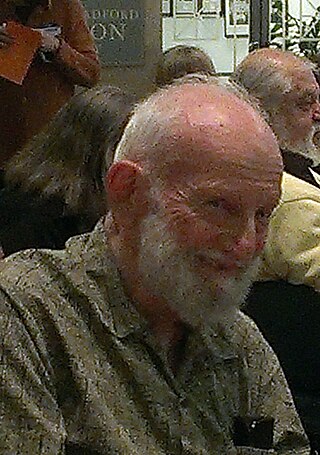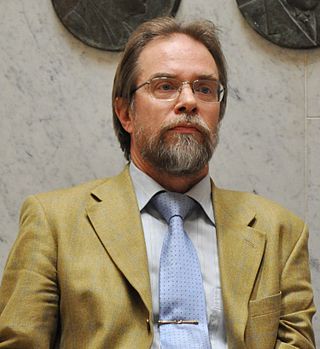
Robert Helmer MacArthur was a Canadian-born American ecologist who made a major impact on many areas of community and population ecology. He is considered a founder of ecology and evolutionary biology.

Arthur Taylor Winfree was a theoretical biologist at the University of Arizona. He was born in St. Petersburg, Florida, United States.

Richard Levins was a Marxist biologist, a population geneticist, biomathematician, mathematical ecologist, and philosopher of science who researched diversity in human populations. Until his death, Levins was a university professor at the Harvard T.H. Chan School of Public Health and a long-time political activist. He was best known for his work on evolution and complexity in changing environments and on metapopulations.
Simon Asher Levin is an American ecologist and the James S. McDonnell Distinguished University Professor in Ecology and Evolutionary Biology and the director of the Center for BioComplexity at Princeton University. He specializes in using mathematical modeling and empirical studies in the understanding of macroscopic patterns of ecosystems and biological diversities.

Ilkka Aulis Hanski was a Finnish ecologist at the University of Helsinki, Finland. The Metapopulation Research Center led by Hanski, until his death, has been nominated as a Center of Excellence by the Academy of Finland. The group studies species living in fragmented landscapes and attempts to advance metapopulation ecology research. Metapopulation ecology itself studies populations of plants and animals which are separated in space by occupying patches.
Richard Timothy Durrett is an American mathematician known for his research and books on mathematical probability theory, stochastic processes and their application to mathematical ecology and population genetics.
Samuel Karlin was an American mathematician at Stanford University in the late 20th century.

Carlos Castillo-Chavez is a Mexican-American mathematician who was Regents Professor and Joaquín Bustoz Jr. Professor of Mathematical Biology at Arizona State University. Castillo-Chavez was founder and the Executive Director of the Mathematical and Theoretical Biology Institute (MTBI) and the Institute for Strengthening the Understanding of Mathematics and Science. For 2019, Castillo-Chavez was Provost Visiting Professor in the Applied Mathematics Division and Data Science Initiative at Brown University. Castillo-Chavez retired from Arizona State University at the end of spring 2020.

Edward Francis DeLong, is a marine microbiologist and professor in the Department of Oceanography at the University of Hawaii, Manoa, and is considered a pioneer in the field of metagenomics. He is best known for his discovery of the bacterial use of the rhodopsin protein in converting sunlight to biochemical energy in marine microbial communities.
Marcus William Feldman is the Burnet C. and Mildred Finley Wohlford Professor of Biological Sciences, director of the Morrison Institute for Population and Resource Studies, and co-director of the Center for Computational, Evolutionary and Human Genomics (CEHG) at Stanford University. He is an Australian-born mathematician turned American theoretical biologist, best known for his mathematical evolutionary theory and computational studies in evolutionary biology, and for originating with L. L. Cavalli-Sforza the theory of cultural evolution.
Claudia Maria Neuhauser is a mathematician whose research focuses on mathematical biology and spatial ecology. She also investigates computational biology and bioinformatics. Neuhauser is currently Interim Vice Chancellor/Vice President for Research at the University of Houston, where she has been employed since 2018.

Abba Gumel is a Professor & The Michael and Eugenia Brin Endowed E-Nnovate Chair in Mathematics at the Department of Mathematics, University of Maryland, College Park. His research, which spans three main areas of applied mathematics, is focused on the use of mathematical modeling and rigorous approaches, together with statistical analysis, to gain insight into the dynamics of real-life phenomena arising in the natural and engineering sciences. The main emphasis of Gumel's work is on the mathematical theory of epidemics – specifically, he uses mathematical theories and methodologies to gain insights into the qualitative behavior of nonlinear dynamical systems arising from the mathematical modelling of phenomena in the natural and engineering sciences, with emphasis on the transmission dynamics and control of emerging and re-emerging human infectious diseases of public health and socio-economic interest.

Jessica Green is an American entrepreneur, engineer, and ecologist. She is CEO of Phylagen, Inc., a biotech startup developing tools to monitor the microbiology of air. Prior to Phylagen, she was a Professor of Biology at the University of Oregon and co-founding director of the Biology and Built Environment Center. Green’s two talks at the TED Conferences on the Microbiomes of the built environment have received over 1.7 million views.
Daniel Mier Gusfield is an American computer scientist, Distinguished Professor of Computer Science at the University of California, Davis. Gusfield is known for his research in combinatorial optimization and computational biology.
Jean Marie Carlson is a professor of complexity at the University of California, Santa Barbara. She studies robustness and feedback in highly connected complex systems, which have applications in a variety of areas including earthquakes, wildfires and neuroscience.

Raissa M. D'Souza is the Associate Dean of Research for the College of Engineering and a Professor of Computer Science and Mechanical Engineering at the University of California, Davis as well as an External Professor and member of the Science Board at the Santa Fe Institute. She was elected a Fellow of the American Physical Society in 2016 and Fellow of the Network Science Society in 2019. D'Souza works on theory and complex systems.
Sharon Y. Strauss is an American evolutionary ecologist. She is a Professor of Evolution and Ecology at the University of California, Davis.








